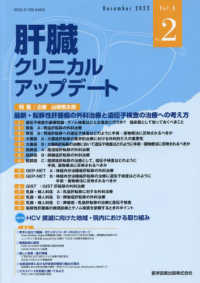- ホーム
- > 洋書
- > 英文書
- > Philosophy
基本説明
The first comprehensive study of Aristotle's teleology.
Full Description
Monte Johnson examines one of the most controversial aspects of Aristiotle's natural philosophy: his teleology. Is teleology about causation or explanation? Does it exclude or obviate mechanism, determinism, or materialism? Is it focused on the good of individual organisms, or is god or man the ultimate end of all processes and entities? Is teleology restricted to living things, or does it apply to the cosmos as a whole? Does it identify objectively existent causes in the world, or is it merely a heuristic for our understanding of other causal processes? Johnson argues that Aristotle's aporetic approach drives a middle course between these traditional oppositions, and avoids the dilemma, frequently urged against teleology, between backwards causation and anthropomorphism. Although these issues have been debated with extraordinary depth by Aristotle scholars, and touched upon by many in the wider philosophical and scientific community as well, there has been no comprehensive historical treatment of the issue.
Aristotle is commonly considered the inventor of teleology, although the precise term originated in the eighteenth century. But if teleology means the use of ends and goals in natural science, then Aristotle was rather a critical innovator of teleological explanation. Teleological notions were widespread among his predecessors, but Aristotle rejected their conception of extrinsic causes such as mind or god as the primary causes for natural things. Aristotle's radical alternative was to assert nature itself as an internal principle of change and an end, and his teleological explanations focus on the intrinsic ends of natural substances - those ends that benefit the natural thing itself.
Aristotle's use of ends was subsequently conflated with incompatible 'teleological' notions, including proofs for the existence of a providential or designer god, vitalism and animism, opposition to mechanism and non-teleological causation, and anthropocentrism. Johnson addresses these misconceptions through an elaboration of Aristotle's methodological statements, as well as an examination of the explanations actually offered in the scientific works.
Contents
I. TELEOLOGY AS A CRITICAL EXPLANATORY FRAMEWORK ; PART II. TELEOLOGICAL EXPLANATIONS IN NATURAL SCIENCE








